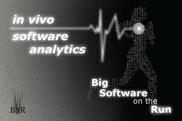Differences
This shows you the differences between two versions of the page.
| Both sides previous revision Previous revision Next revision | Previous revision Last revision Both sides next revision | ||
|
bsr-ws2016:speakers [2016/09/30 22:57] nour.assy |
bsr-ws2016:speakers [2016/10/14 15:47] nour.assy |
||
|---|---|---|---|
| Line 49: | Line 49: | ||
| \\ | \\ | ||
| - | [[http://gpsc.uvigo.es/fernando-perez-gonzalez|Fernando Pérez-González]], **University of Vigo, Spain** | + | [[http://www.win.tue.nl/~mvdbrand/|Mark van den Brand]], **Eindhoven University of Technology, the Netherlands** |
| - | {{:bsr-ws2016:fernando-p.png?direct100x100 }}//Prof. Fernando Pérez-González received the Ph.D. in Telecommunications Engineering in 1993. He is currently Full Professor at the University of Vigo, Spain, and Research Professor at the University of New Mexico. His research interests lie in the crossroads of signal processing, security/privacy and communications, in particular, those problems in which an adversary is present. Recently, he has been actively involved in the advancement of privacy protection in signal processing. He has coauthored more than 200 journal and conference papers, 15 patents, and has participated in 5 European projects related to multimedia security. He has served in the Editorial Board of several international journals, including IEEE Trans. on Information Forensics and Security. He is an elected member of the Galician Royal Academy of Sciences, and a Fellow of the IEEE for contributions to Multimedia Security. | + | {{:bsr-ws2016:mark0.png?direct100x100 }}//Prof. Mark van den Brand started his study computer science in 1982 at the Radboud University Nijmegen (The Netherlands). In 1987 he became a PhD student at the Radboud University Nijmegen. In 1992 he started as assistent professor in the Programming Research Group at the University of Amsterdam. In 1997 he switched from University of Amsterdam to CWI (Centrum voor Wiskunde en Informatica) and became senior researcher and project leader on the ASF+SDF project. The ASF+SDF project is one of the main research topics of the Interactive Software Development and Renovation group. Since 2006 Mark van den Brand is a full professor of Software Engineering and Technology at TU/e in the Department of Mathematics and Computer Science. Since May 2009 he is visiting professor at Royal Holloway, University of London. |
| + | |||
| + | His current research activities are on generic language technology, and model driven engineering. A number of his research topics are to investigate the correctness and quality aspects of model transformations, and the use of meta-modeling techniques in the area of functional safety. The SET group participates/participated a number of (industrial) projects related to model driven engineering and software evolution. The goal of his research is to investigate the correctness and quality aspects of model transformations. | ||
| + | |||
| + | He is president of the European Association of Programming Languages and Systems (EAPLS) and chair of the steering committee of Software Language Engineering. He was six times guest editor of special issues of Science of Computer Programming on academic software development (Experimental Software and Toolkits (EST)). He is member of the editorial board of the journal of Science of Computer Programming, Central European Journal for Computer Science, and Journal of Computer Languages, Systems and Structures. | ||
| // | // | ||
| Line 77: | Line 81: | ||
| - | [[http://mmc.tudelft.nl/users/inald-lagendijk|Inald Lagendijk]], **Delft University of Technology** | + | [[http://cybersecurity.tudelft.nl/users/zekeriya-erkin|Zekeriya Erkin]], **Delft University of Technology** |
| - | {{:people:inaldlagendijk.jpg?direct100x100 }}//Prof. Inald Lagendijk has been with Delft University of Technology since 1985. He is a full professor in the field of multimedia signal processing, and holds the chair of Information and Communication Theory. His past research included image sequence restoration and enhancement, image and video compression, 3D television, visual quality measures, motion and depth estimation, mobile multimedia communications, and digital content protection such as watermarking. In recent years he has been actively involved in shaping and exploring the field of privacy protected signal processing. | + | {{:people:zekeriyaerkin.jpg?direct100x100 }}//Dr. Zekeriya Erkin is an assistant professor in the Cyber Security Group, where he works on Privacy Enhancing Technologies. His main research goal is to protect private data in online applications against misuse. One way to achieve this goal is to hide the private data by means of encryption in such a way that without the authorization of the data owner, no one can see the content but still process the encrypted data for the required service. One simple example is to encrypt an image and ask the service provider if there is a face image of a suspect. Since the image is encrypted, there is no way of saying for the service provider. However, it is possible to determine this by running interactive, cryptographic protocols based on Homomorphic Encryption and Secure Multiparty Computation techniques.// |
| - | Professor Lagendijk is elected member of the Royal Netherlands Academy of Arts and Sciences (KNAW), elected member of the Royal Holland Society of Sciences and Humanities (KHMW), member of Netherlands Academy of Technology and Innovation (AcTI), and he is a Fellow of the IEEE (for Contributions to Image Processing).// | + | |
| \\ | \\ | ||

